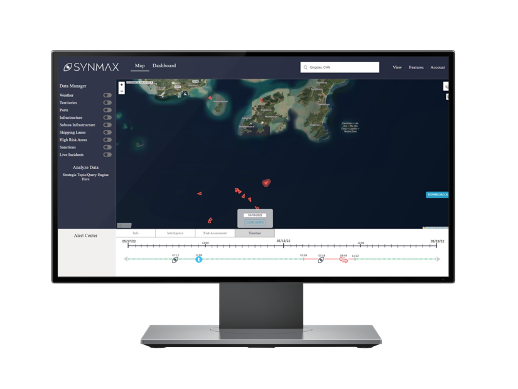Maritime Artificial Intelligence & Machine Learning: Ultimate Guide
Artificial Intelligence and Machine Learning are buzzwords that permeate every industry and sector around us. Inevitably, the potential of maritime Artificial Intelligence technology and maritime Machine Learning algorithms can be harnessed in the maritime and shipping industries.
Spire Maritime brings you the ultimate guide to these technologies and their use cases in the marine and maritime space – but let’s start with the basics: what is ML and AI in maritime?
How maritime Machine Learning & Artificial Intelligence (AI) is changing the maritime industry
In recent years, the integration of Machine Learning (ML) and Artificial Intelligence (AI) technologies has begun to reshape the maritime industry. From improving operations to enhancing safety measures, ML and AI are revolutionizing decision-making processes and unlocking new possibilities for the sector’s future.
This section explores the transformative impact of maritime ML and AI, delving into their applications, benefits, use cases and potential challenges. So, what is ML in maritime?
Increase route and vessel performance prediction accuracy
ML and AI can analyze historical and real-time data, such as weather conditions, sea currents, and vessel performance, to better suggest shipping routes, accurately predict arrival times, reduce fuel consumption, and improve on-time delivery.
Enhance safety and risk management
Data analysis from various sources, including vessel behavior, weather patterns, and navigational data, are enabled by ML and AI, allowing the identification of potential safety risks, collision prediction, and overall maritime safety enhancement.
Better manage cargo and fleet
ML and AI algorithms can analyze data related to cargo capacity, demand forecasting, and fleet performance to optimize cargo allocation, improve scheduling, and enhance overall fleet management efficiency in the shipping and freight industry. This empowers stakeholders to respond to changing conditions, adapt to market demands, and optimize their strategies.
Improve environmental monitoring
By combining and analyzing multiple data sets, such as vessel performance, weather data, and marine life patterns, AI and ML processes can be used to monitor and mitigate the impact of maritime operations on the environment, reduce vessel CO2 emissions, and enable more sustainable practices in the shipping industry.
Digitalize port logistics and optimization
ML and AI can optimize port operations by analyzing data on vessel arrivals, cargo handling, storage, and transportation, enabling efficient allocation of port resources and reducing port congestion.
Predict vessel maintenance patterns
By using Machine Learning algorithms, one can analyze sensor data from ships, as well as the ship’s AIS data, to uncover vessel patterns and predict potential equipment failures or maintenance needs, allowing for proactive predictive maintenance and minimizing costly downtime.
Empower advanced analytics and decision-making
ML and AI algorithms can process and analyze large volumes of data in real-time, enabling maritime companies to make informed decisions quickly. This empowers stakeholders to respond to changing conditions, adapt to market demands, and optimize their strategies.
Enable autonomous shipping
The development of autonomous ships is being enabled by ML and AI, a development which has the potential to revolutionize the industry. Autonomous vessels can navigate with precision, make real-time decisions, and optimize operations, leading to increased efficiency, reduced human error, and potentially lower operational costs.
Exploring the use of AI in the Maritime Industry
From industry collaboration and communication improvement, to voyage planning, domain intelligence increase and more, there is a healthy ecosystem of up and coming maritime innovators making use of AI in the shipping industry. Let’s take a look at some of the leaders in the global maritime sector:
Using AI to deliver predictive data analytics and market performance insights
Freightflows are a predictive analytics company for global trade, who deliver contextual, trade-specific information about what is happening on the water, ongoing and historical trade, as well as predictive patterns.
Through the adoption of AI and ML models, and ingesting Historical AIS data, they deliver state of the art analytics, vessel behavior predictions, port activities and market performance.
Watch the Spire Maritime and Freightflows webinar on Historical AIS and ML:
Innovating in inland waterways voyage planning using an AI-based approach
Trabus Technologies differentiates itself from competitors through its advanced AI-based approach to voyage planning.
While others rely on traditional methods, Trabus utilizes analytical tools that forecast river and travel time conditions, providing valuable insights and positive influence in navigation decisions.
Watch the Trabus Technologies customer testimonial on using Spire Maritime Historical data to feed their models:
Increasing maritime domain intelligence using Machine Learning and AI
SynMax’s maritime domain intelligence product, Theia, fuses multiple data streams (including Spire Maritime AIS data) to counter dark shipping activities and bring visibility into illegal activities globally.

Leveraging the collaborative workflow and data platforms using AI
Shipfix use AI to recognize message types and its content and parse billions of data points, focusing on extracting all content, deduplicating, structuring and presenting it in a user-friendly way. This empowers their customers to collaborate more easily, increasing efficiency in navigating through mailboxes and understanding market trends.
The importance of AI in the maritime industry
In an industry where digitalization is behind the curve, but quickly catching up, AI, ML and Natural Language Processing (NLP) are important factors in obtaining a competitive advantage. AI plays a crucial role improving processes, providing predictions and detecting patterns and anomalies using large data sets.
Improve automation processes
Automating current manual processes, like old-fashioned communication, is a key optimisation brought on by AI. Detection of vessel names, contacts, shipowner and technical information in phone calls, emails and other typically offline sources of information can massively improve communication and cooperation in the maritime industry.
Replace manual input with data-driven, predictive information
Depending on human, error-prone input is often a handicap in the maritime industry. State-of-the-art digital technologies can be a massive improvement, using massive amounts of data to provide much more reliable information, like ETAs or routing that are the result of ingesting many more data points, including vessel tracking data, Internet of Things (IoT) data, weather conditions or port congestion.
Detect patterns or anomalies using data
Sifting through billions of data points requires ML models and AI, and constitutes the only reliable way to select which data is relevant for a specific use case. Using AI specific techniques like neural networks, machine learning algorithms can cause an important improvement in the processing flow of data in maritime organizations.
Challenges of maritime Artificial Intelligence
The implementation of AI and Machine Learning programs in the maritime sector is not without challenges. Here are some aspects that one needs to take into consideration when implementing technical programs that include AI and ML components:
Data quality and accessibility
The maritime industry faces challenges in ensuring data quality and accessibility. Data from various sources may be inconsistent or incomplete, requiring standardization efforts. Accessing real-time data from ships and integrating it with onshore systems can also be complex.
Integration with existing systems
Integrating AI with existing maritime systems can be a challenge. Legacy infrastructure and disparate software systems may require updates or modifications to effectively incorporate AI technologies. Ensuring seamless integration without disrupting ongoing operations is a crucial consideration.
Data standardization
Data standardization is a significant challenge in implementing AI in the maritime industry. Varying data formats, inconsistent data quality, and different data sources hinder effective analysis and utilization. Establishing industry-wide standards for data collection, formatting, and sharing is crucial to ensure compatibility and interoperability among different systems and stakeholders.
Industry-wide collaboration
Implementing AI requires collaboration among stakeholders. Cooperation between shipping companies, port authorities, technology providers, and regulatory bodies is essential to address common challenges, share best practices, and develop unified frameworks. Collaborative efforts promote knowledge exchange, accelerate innovation, and ensure the successful adoption of AI technologies across the maritime ecosystem.

The future of machine learning in the maritime industry
The future of Machine Learning (ML) in the maritime industry holds immense potential:
- ML will continue to play a pivotal role in transforming maritime operations, driving innovation, and improving efficiency.
- Advancements in ML algorithms and data analytics will enable more accurate predictions, enhanced decision-making, and automation of various tasks.
- The integration of ML with other emerging technologies like Internet of Things (IoT), blockchain, and autonomous systems will further revolutionize the industry.
- ML’s applications will expand to areas such as real-time monitoring, environmental sustainability, crew management, and supply chain optimization.
- As ML continues to evolve, it will propel the maritime industry towards a more connected, intelligent, and resilient future.
How Spire Maritime can help
As providers of the most comprehensive AIS vessel tracking data, Spire Maritime is at the core of the maritime digital revolution. Spire Maritime data is the foundation for machine learning models, especially considering the flexible options of delivery (one-time purchases or live API feeds) and the vast historical data archive available.
Get in touch with our team of experts today and start feeding your machine learning and AI models with Spire Maritime AIS data.
Get started with Spire Maritime AIS data Make a Historical AIS data purchase


